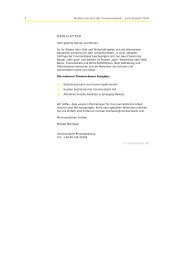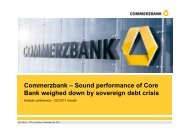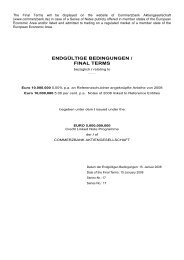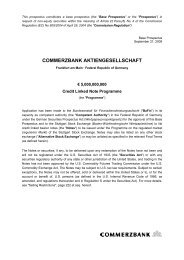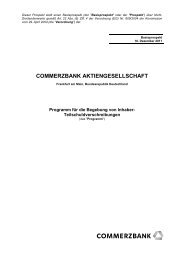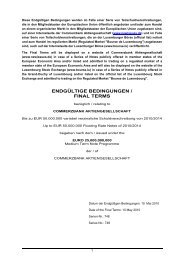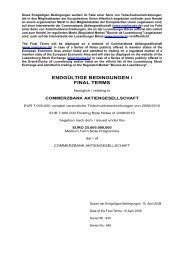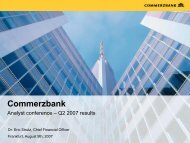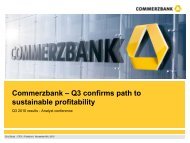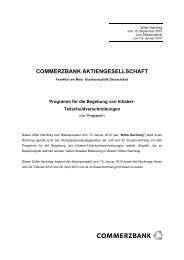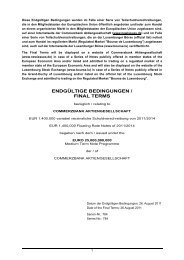COMMERZBANK AKTIENGESELLSCHAFT
COMMERZBANK AKTIENGESELLSCHAFT
COMMERZBANK AKTIENGESELLSCHAFT
Create successful ePaper yourself
Turn your PDF publications into a flip-book with our unique Google optimized e-Paper software.
To our Shareholders Corporate Responsibility Management Report Risk Report Group Financial Statements Further Information 215 271<br />
258 202 Statement of comprehensive income<br />
260 204 Balance sheet<br />
262 206 Statement of changes in equity<br />
264 208 Cash flow statement<br />
266 210 Notes<br />
409 353 Auditors’ report<br />
(4) Principles of consolidation<br />
Subsidiaries are companies in which Commerzbank<br />
Aktiengesellschaft directly or indirectly holds the majority of the<br />
voting rights or where it has power to determine their financial<br />
and operating policies in another way and thus exercise control<br />
over them so as to obtain benefits from their activities.<br />
Consolidation takes effect from the date on which the Group<br />
acquires the majority of the voting rights or gains control over<br />
the company concerned.<br />
For the consolidation of capital, we remeasure the assets and<br />
liabilities of subsidiaries completely every year, regardless of the<br />
percentage share of equity at the time of acquisition. The assets<br />
and liabilities remeasured at fair value are included in the<br />
consolidated balance sheet net of deferred taxes; identified<br />
hidden reserves and liabilities are accounted for in accordance<br />
with the applicable standards in subsequent reporting periods.<br />
Any difference over net assets on remeasurement is recognised<br />
as goodwill.<br />
Associated companies are entities over which Commerzbank<br />
Aktiengesellschaft has a significant direct or indirect influence.<br />
A significant influence is assumed to exist where the share of<br />
voting rights is between 20% and 50%. Additional criteria for<br />
judging whether there is significant influence include substantial<br />
business transactions with the entity in question, membership of<br />
a management or supervisory board, or involvement in setting<br />
the entity’s business policies.<br />
Jointly controlled entities are companies over which we<br />
exercise joint control together with another company. Joint<br />
control may arise as a result of each company holding equal<br />
voting rights or based on contractual agreements.<br />
Associated companies and jointly controlled entities are<br />
ordinarily accounted for using the equity method and are<br />
reported in the balance sheet under holdings in companies<br />
accounted for using the equity method.<br />
The acquisition cost of these investments including any<br />
goodwill contained therein is determined at the time of their<br />
initial consolidation, applying by analogy the same rules as for<br />
subsidiaries. For material associated companies and jointly<br />
controlled entities appropriate adjustments are made to the<br />
carrying value in the accounts.<br />
Holdings in subsidiaries not consolidated for reasons of<br />
immateriality and holdings in associated companies and jointly<br />
controlled entities which, because of their immateriality, are not<br />
accounted for using the equity method are shown under<br />
financial investments at their fair value or, if this cannot be<br />
reliably established, at cost.<br />
Subsidiaries are deconsolidated as of the date on which the<br />
Bank loses its control over them. Equity accounting for holdings<br />
in associated companies ends on the date that the share of<br />
voting rights falls below 20% or other possibilities of exercising<br />
significant influence over the associated company cease to<br />
apply. Equity accounting for joint ventures ends on the date the<br />
joint management of the venture comes to an end.<br />
The obligation to consolidate special purpose entities under<br />
certain circumstances derives from SIC 12. This stipulates that<br />
consolidation is required if the special purpose entity is<br />
controlled by the parent company. This may be the case if, in<br />
substance,<br />
• the activities of the special purpose entity are conducted on<br />
behalf of the entity according to its specific business needs<br />
so that the entity obtains benefits from the operations of the<br />
special purpose entity;<br />
• the entity has the decision-making powers to obtain the<br />
majority of the benefits of the activities of the special purpose<br />
entity or, by setting up an autopilot mechanism, the entity<br />
had delegated these decision-making powers;<br />
• the entity has rights to obtain the majority of the benefits of<br />
the special purpose entity and therefore may be exposed to<br />
risks incident to the activities of the special purpose entity;<br />
• the entity retains the majority of the residual or ownership<br />
risks related to the special purpose entity or its assets in<br />
order to obtain benefits from its activities.<br />
In the Commerzbank Group the obligation to consolidate special<br />
purpose entities is examined by means of a process that<br />
includes transactions where we form a special purpose entity<br />
with or without the involvement of third parties, and transactions<br />
in which we enter into contractual relations with an already<br />
existing special purpose entity. The decision to consolidate is<br />
regularly reviewed by us. All consolidated special purpose<br />
entities and special purpose entities that have not been<br />
consolidated for materiality reasons are listed in Note 106.<br />
Group Financial Statements



